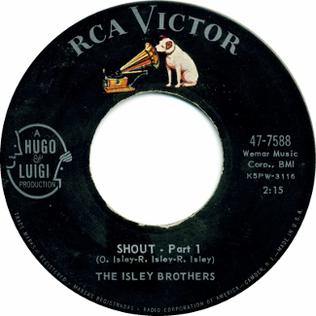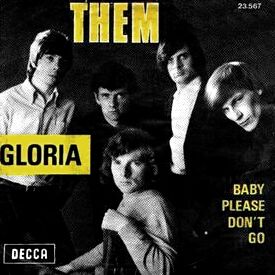" That's All She Wrote " is a 2010 song by rapper T.I.
Contents
That's All She Wrote may also refer to:
" That's All She Wrote " is a 2010 song by rapper T.I.
That's All She Wrote may also refer to:

Roger Dean Miller Sr. was an American singer-songwriter, widely known for his honky-tonk-influenced novelty songs and his chart-topping country hits "King of the Road", "Dang Me", and "England Swings".

"Danny Boy" is a song with lyrics written by English lawyer Frederic Weatherly in 1910, and set to the traditional Irish melody of "Londonderry Air" in 1913.

"Shout" is a popular song, written and originally recorded by American vocal group the Isley Brothers in 1959. Later versions include a UK Top 10 hit in 1964 by Scottish singer Lulu.
"Hi-Lili, Hi-Lo" is a popular song with music by Bronislaw Kaper, and lyrics by Helen Deutsch. The song was published in 1952. The song was featured in the 1953 film Lili, starring Leslie Caron.
"Slow Poke" is a 1951 popular song.
Johnny Kidd & the Pirates were an English rock band led by singer/songwriter Johnny Kidd. Their musical journey spanned from the late 1950s to the mid-1960s, during which they achieved considerable success with hit songs like "Shakin' All Over" and "Please Don't Touch".

"I Can't Stop Loving You" is a popular song written and composed by country singer, songwriter, and musician Don Gibson, who first recorded it on December 3, 1957, for RCA Victor Records. It was released in 1958 as the B-side of "Oh, Lonesome Me", becoming a double-sided country hit single. At the time of Gibson's death in 2003, the song had been recorded by more than 700 artists, most notably by Ray Charles, whose recording reached No. 1 on the Billboard chart.
"Dream", sometimes referred to as "Dream (When You're Feeling Blue)", is a jazz and pop standard with words and music written by Johnny Mercer in 1944. He originally wrote it as a theme for his radio program. It has been and performed by many artists, with the most popular versions of this song recorded by The Pied Pipers, Frank Sinatra, and Roy Orbison.

"Gloria" is a rock song written by Northern Irish singer-songwriter Van Morrison, and originally recorded by Morrison's band Them in 1964. It was released as the B-side of "Baby, Please Don't Go". The song became a garage rock staple and a part of many rock bands' repertoires.

Joanie Sommers is an American singer and actress with a career concentrating on jazz, standards and popular material and show-business credits. Once billed as "The Voice of the Sixties", and associated with top-notch arrangers, songwriters and producers, Sommers' popular reputation became closely tied to her biggest, yet most uncharacteristic, hit song, "Johnny Get Angry".
"You're Nobody till Somebody Loves You" is a popular song written by Russ Morgan, Larry Stock, and James Cavanaugh and published in 1944. The song was first recorded by Morgan and was a hit for him in 1946, reaching the No. 14 spot in the charts. The best known version was Dean Martin's, which was released in 1960 and reissued in 1964.
"Release Me", is a popular song written by Eddie "Piano" Miller and Robert Yount in 1949. Four years later it was recorded by Jimmy Heap & the Melody Masters, and with even better success by Patti Page (1954), Ray Price (1954), and Kitty Wells (1954). Jivin' Gene [Bourgeois] & the Jokers recorded the tune in 1960, and that version served as an inspiration for Little Esther Phillips, who reached number one on the R&B chart and number eight on the pop chart with her big-selling cover. The Everly Brothers followed in 1963, along with Lucille Starr including a translation in French (1964), Jerry Wallace (1966), Dean Martin (1967), Engelbert Humperdinck (1967) who was number one on the UK Singles Chart and many others in the years after such as Jewels Renauld (2022).
"Crazy Arms" is an American country song which was a career-making hit for Ray Price. The song, released in May 1956, went on to become a number 1 country hit that year, establishing Price's sound, and redefining honky-tonk music. It was Price's first No. 1 hit.

...And Then I Wrote is the debut studio album by country singer Willie Nelson, recorded during August and September 1962 and released through Liberty Records.

Olé is a Latin American album by American pop singer Johnny Mathis that was released by Mercury Records in November 1964 and includes Spanish-language versions of English-language chart hits by Frank Sinatra ("Granada") and Sarah Vaughan ("Serenata") as well as the signature song of the I Love Lucy character Ricky Ricardo that was played by Desi Arnaz ("Babalu").
"I'll Be There "' is a song co-written and originally released as a single by American country artist Ray Price. After becoming a major country hit in 1954, the song has been covered by numerous artists such as Cowboy Copas, Elvis Presley, Connie Smith, Johnny Bush, George Jones and Tammy Wynette, Ronnie Milsap, Heather Myles, Martina McBride, Sam Palladio, Don White & Eric Clapton, Willie Nelson, Nick Lowe, Gail Davies and J. J. Cale.
"Monica" is a song by the English rock band the Kinks from their sixth studio album, The Kinks Are the Village Green Preservation Society (1968). Written and sung by Ray Davies, the song was recorded sometime between late 1967 and May 1968. The song features congas and a syncopated rhythm, indicating Davies's continued interest in calypso music. Its lyrics are a serenade for a prostitute and were partly inspired by Dylan Thomas's radio drama, Under Milk Wood (1954), though Davies kept the lyrics deliberately subtle to avoid a radio ban. Retrospective commentators have disputed the song's level of thematic cohesion with the others on Village Green.
"Help Me" is a song written by Larry Gatlin. A country gospel song, the lyrics tell the story of a world-weary and tired man pleading for guidance and reassurance from God. Gatlin performed the song at the funerals of both June Carter and Johnny Cash and dedicates the song to them during every performance.

Herbert Paul Gilley was an American country music lyricist and promoter from Kentucky. In his lifetime, he was little known as a songwriter, but decades after his death by drowning at age 27, he was identified more widely as likely having written the lyrics to a dozen famous songs, including two that were hits for Hank Williams: "Cold, Cold Heart" and "I'm So Lonesome I Could Cry". He may have also written "I Overlooked an Orchid", which was a number-one country hit in 1974 for Mickey Gilley. Other songs that have been attributed to Gilley include "If Teardrops Were Pennies", "Don't Let the Stars Get in Your Eyes", and "Crazy Arms".

"Anyone Who Knows What Love Is (Will Understand)" is a 1964 R&B song written by Jeannie Seely, Randy Newman, Judith Arbuckle and Pat Sheeran. It was recorded by Irma Thomas and released as a single the same year, with "Time Is on My Side" as the B-side. The song is about a woman who stays in a relationship with a man despite his bad behavior.